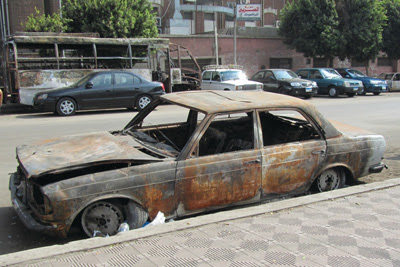Whether in Imbaba, in Abou Qorqas or in Maspero, people here share the very same reality – one of fear. “Christians are scared, it is very dangerous,” a young man from Abou Qorqas tells us as he stands on the roof of a building adjoining the church. We cannot take pictures or film in this place – the two parish priests, fearing reprisals, refused to give us an interview in front of the camera.
We were visiting here six months after attacks that put 70 Christian families out on the streets when their homes and businesses were burned and pillaged in inter-religious violence. The knot at the centre of the conflict had less to do with religion than it did with quarrelling between two families. But no matter the cause, the consequences themselves were devastating for the Christians.
The same young man continued: “The children are in a bad mood, they have not slept in six months because their houses were set alight while they were inside.”
The villagers all wish to leave. There is no employment for them, no justice. They are arrested arbitrarily and can say nothing to denounce the situation.
The only positive note if there is one, is that the Catholic churches and the Orthodox and Protestant churches are helping one another and sharing the help they have received according to the needs of the people. About thirty Catholic families were left homeless. Half of them are housed by other families in the neighbourhood and the other half currently live in apartments the church has rented to them.
Bishop Antonio Aziz Mina of Gizeh is categorical in saying: “The source of violence is ignorance and poverty.” As we are speaking a great deal about the Christian exodus, he adds: “For every Christian who leaves, there are nine Muslims who also leave. I don’t want that. We encourage our faithful to stay… We want to participate fully and help in the prosperity of our country.”
Bishop Mina knows what he speaks of as the Imbaba neighbourhood, situated in his diocese, was rocked by violence on May 12, leaving 12 dead. The neighbourhood of Maspero (Cairo) where the assaults of October 9 left more than 25 dead and hundreds wounded is also part of his diocese.
There too, fear dominates. Proof of this: the simple act of a photographing or filming a church in Imbaba cost us 40 minutes worth of discussion with a police man. Even though everything took place calmly and politely, it is nonetheless a sign that the situation remains very tense.
Fear is an enemy that infiltrates everywhere, even in quiet and completely Christian villages. We observed this in Deir Dronka, a village of 3,500 people, all of them Christians. The inhabitants of the village are simple people making their living largely from agriculture. Not one incident was reported in this peaceful village.
And yet, they are frightened, claims their bishop, Monsignor Kyrillos William. “They want to leave the country because there are always massacres of Christians,” he tells us. What they hope is to go to Italy or America, but how many will succeed?
Some say they will go and vote [in the parliamentary elections which took place in late November], others not. People tell us: “The army is supposed to defend us, and they are killing us… so what good is there in voting?” Come what may, Church leaders are encouraging people to vote. They don’t say for whom they should vote, they are free. It is the exercise of democracy in which people are encouraged to participate.
The results of this suffering, of this fear and this uncertainty, will not be known in the near future as the electoral process will stretch over several months, or even a year. The process has only just begun and new inter-religious violence has already taken place.
What is left for Egyptians, both Christian and Muslim? Faith.




